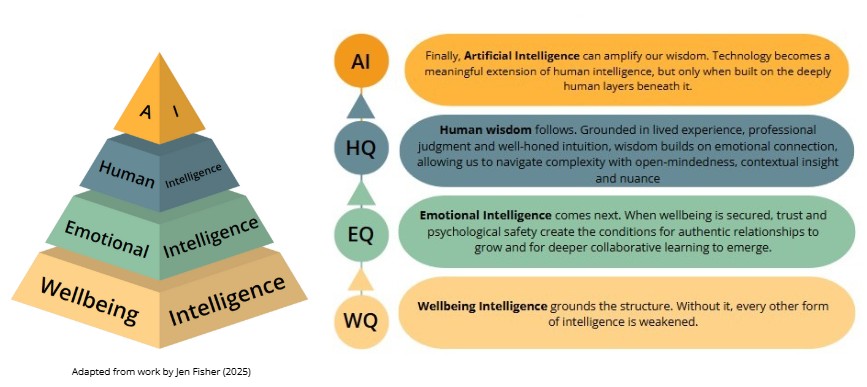Leading through Complexity: Why Wellbeing Intelligence is The Bedrock of Sustainable Success
Leading through Complexity: Why Wellbeing Intelligence is The Bedrock of Sustainable Success
There is a powerful tension at play across international schools today.
On one hand, leaders and educators are deeply engaged with some of the most exciting and urgent conversations in education: AI integration, curriculum redesign, recruitment challenges, governance reform, student voice – the list goes on.
On the other hand, the weight of these conversations, layered one upon another, is creating unsustainable pressure.
I’ve attended several exceptional education conferences recently where I found myself both inspired and concerned. Inspired by the ideas and ambition present in every room yet concerned by the growing burden being placed on the people leading the work.
The reality is this: it’s not a lack of care, willingness or leadership that schools are struggling with, it’s the capacity to carry so much, for so long, without effective systemic support.
It is for this very reason that Wellbeing Intelligence has become the foundational skillset upon which everything else must rest if international schools are to continue performing in a way that is strong, human-centred and future focussed.
First Things First – No Wellbeing, No Wisdom
Maslow’s well known hierarchy reminds us that fundamental human needs must be met before higher-order growth can occur and, in a similar vein, Jen Fisher introduces us to the notion of The Intelligence Stack. This emerging concept is built on the principle that each layer of intelligence supports and strengthens the next and it is grounded by the belief that sustainable growth comes from positioning these layers in the right order, starting with what matters most.
 Without wellbeing laying the foundations, authentic emotional connection struggles to form, wisdom is harder to access and innovation cannot effectively take root. The Intelligence Stack offers a blueprint for designing stronger, more human-centred organisations ready to thrive in a rapidly changing world.
Without wellbeing laying the foundations, authentic emotional connection struggles to form, wisdom is harder to access and innovation cannot effectively take root. The Intelligence Stack offers a blueprint for designing stronger, more human-centred organisations ready to thrive in a rapidly changing world.
Advanced Wellbeing Intelligence acknowledges that wellbeing is a precondition for human sustainability and organisational success. It allows for the development of well-designed work and wellbeing-forward systems, without which the foundations of our workplaces remain unstable and we begin to play a dangerous game of Jenga with our organisational health.
Why Wellbeing Intelligence Matters More Than Ever in International Schools
International schools today operate in complex, fast-changing environments. Shifting student and staff demographics, evolving parental expectations, global instability and increasingly competitive recruitment markets all contribute to an almost constant flow of change and uncertainty for leaders and staff alike and we should not be underestimating the human cost of this. When leaders and their teams are operating from a place of depletion, their capacity for the complex work of innovation and improvement is compromised and, all the while, the demands continue to mount. It’s like trying to lay the foundations of a house after construction has already begun – crucial work is happening everywhere, but the structural stability is missing.
As service-driven educators, we often succumb to the subtle narrative that when things feel overwhelming, we should double down on our personal capacity: manage our time better, become more efficient, build our bounce-back muscle. But in truth, this isn’t a call for more individual resilience, (and nor should It be); it’s a call for better foundations, because without systems and practices that protect and promote staff wellbeing, even the most dedicated teams will eventually be stretched too thin.
What I witnessed in those recent conference sessions was far from a failure of resilience; it was a test of capacity, playing out across schools where people care deeply, but are struggling to find solid ground.
Building The Foundations for Managing Complexity
One of the most powerful shifts leaders can make today is to move from asking “How do we help our people carry more?” to “How do we build foundations that allow us to manage the complexity?”
Achieving the desired stability doesn’t mean achieving the impossible and removing the steady stream of challenges faced by the education sector, it means creating environments in which wellbeing is systemically embedded. It’s about designing work for human sustainability – from the bottom up.
Wellbeing Intelligence in leadership can look like:
- Embedding wellbeing principles into strategic planning and decision-making.
- Prioritising psychological safety within team culture.
- Creating systems that monitor workload and allow meaningful recovery.
- Recognising that purpose, meaning and connection are all essential for high performance.
- Protecting time for reflection, collaboration and simple human interaction, especially when things feel busiest.
Immediate Action for Leaders
If you’re wondering where to begin building Wellbeing Intelligence in your school or organisation, a simple but powerful starting point is to audit your wellbeing foundations.
Take an honest look at the systems and practices currently in place and approach it with the same seriousness and rigour as curriculum, safeguarding or financial audits.
Start by asking:
- Are our wellbeing supports reactive (only triggered when something goes wrong) or proactive?
- Where in our strategic priorities is staff wellbeing explicitly embedded, not just implied?
- Are leaders at all levels equipped to recognise and respond to signs of team strain, not just individual struggle?
Wellbeing Intelligence is The New Leadership Intelligence
The future of education demands a new model of leadership, one that sees wellbeing as the bedrock of organisational strength and which understands that a focus on Wellbeing Intelligence doesn’t slow strategic ambition, it strengthens and sustains it.
The best international schools of the future will be those that recognise:
- Wellbeing is structural, not ornamental.
- Leadership at all levels must be equipped, empowered and supported to foster cultures of wellbeing.
- Sustainable success is built on human thriving, not just human time and effort.
I am passionate about helping international schools embed Wellbeing Intelligence as a leadership skillset and a strategic advantage. Through training, coaching, consultancy, and bespoke programmes, I work with organisations to:
- Equip leaders at every level with practical tools to design for wellbeing.
- Align wellbeing with whole-school strategic planning
- Build cultures where people feel connected, energised and capable of doing their best work.
If you’re ready to consciously design systems where people can truly thrive, get in touch to explore how we can work together to develop Wellbeing Intelligence in your leadership teams and across your whole organisation.
👉 www.wellwellwell.work 👉 hello@wellwellwell.work
References
This article was inspired by the recent thought work of Jen Fisher, former Human Sustainability Leader and leading voice on workplace wellbeing and the future of work.
About the author

Steph Hawkins
With 20 years’ experience in education and leadership across international and UK schools, Steph now specialises in workplace wellbeing, combining a Master’s in Applied Positive Psychology with a deep understanding of what helps people and organisations thrive. Through her consultancy, Well Well Well, she partners with schools to embed sustainable wellbeing practices that strengthen leadership, boost staff engagement and shape healthier school cultures.
You might also like...
Rethinking Recess: 7 Steps to Foster Engagement and Inclusion
16th January 2025
Artificial Intelligence in Education: Answering the frequently asked questions
22nd August 2024
Why Does Student Voice Matter in the Curriculum?
21st November 2023
LAST but not least: The adaptive work of the teacher
8th July 2024
Reflections on an Unusual Admissions Season: Are We Seeing More Girls on the Autism Spectrum? What are You Seeing?
4th November 2023
